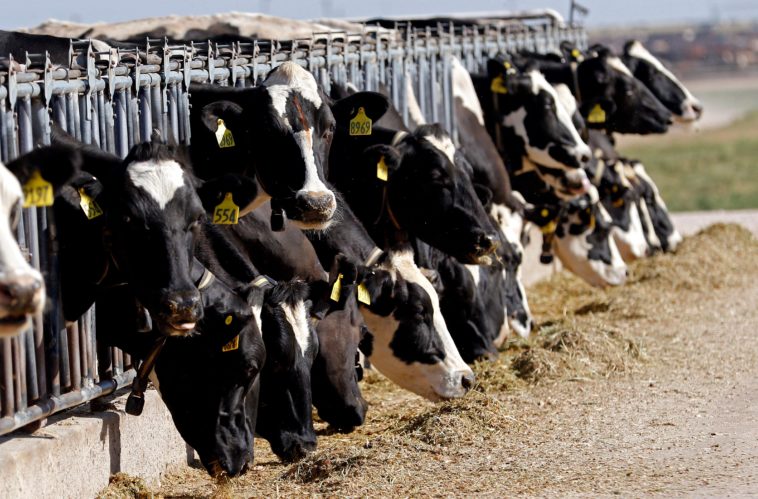NMSU seeks to help improve food supply chain amid COVID-19 – Las Cruces Sun-News

| New Mexico State University
LAS CRUCES – What does a more resilient food supply chain look like in a world still grappling with COVID-19? That’s the question researchers at New Mexico State University are now trying to answer as they work with agricultural producers and other universities to adapt an industry hit hard by the coronavirus pandemic.
Disruptions to the food supply chain became visible this spring after states across the country issued stay-at-home orders, halted in-person learning and implemented other measures to mitigate the spread of COVID-19. Images and media reports showed empty shelves at grocery stores, long lines at food banks and an overabundance of fresh food intended for shuttered schools and businesses with nowhere to go.
“We consume approximately 50 percent of our food away from home,” said Jay Lillywhite, agribusiness management and marketing professor in the College of Agricultural, Consumer and Environmental Sciences at NMSU. “Within a matter of weeks, you had multiple states limiting restaurant sales, schools shutting down, and a system built to supply food to those away-from-home outlets had to adjust to more food being purchased for consumption at home.”
Others are reading: Report: Gov. Michelle Lujan Grisham out of running for Biden’s HHS secretary
At issue were laws governing food labeling, packaging and sizing, which vary from market to market, Lillywhite said. Manufacturers and distributors that did not have the resources to repackage and relabel fresh foods for another market were left paralyzed from a logistical standpoint at the outset of the crisis, resulting in spoiled food and lost money.
In response, the Food and Drug Administration in May made temporary adjustments to certain labeling requirements as part of an effort to help alleviate the problem.
“As we start to see the light at the end of the tunnel, maybe that won’t be quite as significant going forward. I don’t know for sure. A lot of this is uncertain,” Lillywhite said.
College of ACES Dean Rolando A. Flores, a food scientist, said the pandemic revealed weaknesses in the food supply chain. One of the weakest links, he said, was the food manufacturing sector, in particular food processing plants, many of which are highly dependent on labor.
More: New Mexico migratory bird deaths: Lab report points to starvation, weather conditions
Early in the pandemic, many large-scale food processing plants struggled to implement social distancing guidelines and experienced high COVID-19 infection rates among workers, resulting in plant closures and product shortages. Infrastructure designed for efficiency likely exacerbated challenges at these facilities, Lillywhite explained.
“Trying to social distance in those environments is very difficult. It’s not impossible, but it takes time,” he said, adding, “In the production cycle, animals won’t stop growing because a facility shuts down, and they can’t sit at the farm waiting for the facility to reopen. They’re stacking up, and now what do you do? That’s the challenge.”
Flores said a stronger food supply chain would require operational changes, but he also noted that working conditions would play a critical role in improving the system.
“We need to realize that the food chain is sensitive and recognize that manufacturers will need to provide better conditions to protect employees,” he said, adding that ACES is collaborating with other universities to improve the food system. “Right now, this research is a priority,” he said.
In a more resilient system, Flores said, the producing sector — farmers, ranchers and growers — would have more opportunities to organize the delivery of their goods in alternative markets during emergencies, allowing them to maximize their profitability and reduce waste in uncertain times. Producers, especially those in New Mexico, should also focus on value-added crops and processing, he said.
“We need to be open-minded to create new, more creative alternatives,” he said.
Related: New Mexico food banks prepare to buy millions of meals
Still, Lillywhite said the current agricultural system largely remains efficient and effective. He also noted that the long-term effects of the pandemic on the industry remain unknown, describing the crisis as a once-in-a-lifetime situation comparable to the Great Depression.
“We’re in challenging times, and I don’t know that we’ll know all the answers for some time,” he said. “After the Great Depression, we looked back and said the government could have done somethings differently to mitigate the problem. We may look back on this pandemic in a few years and say we wish we would’ve done some things differently.”
Regardless, Flores said, ACES will be at the forefront of developing 21st-century solutions.
“The food chain, value-added processing and food markets are critical and important to the College of ACES,” he said. “Through research, teaching and Extension, our goal is to increase knowledge and understanding in these areas and contribute critical improvements.”
Carlos Andres López writes for New Mexico State University Marketing and Communications and can be reached at 575-646-1955, or by email at carlopez@nmsu.edu.
More from NMSU:
Published at Sat, 05 Dec 2020 16:10:58 +0000






Comments
Loading…